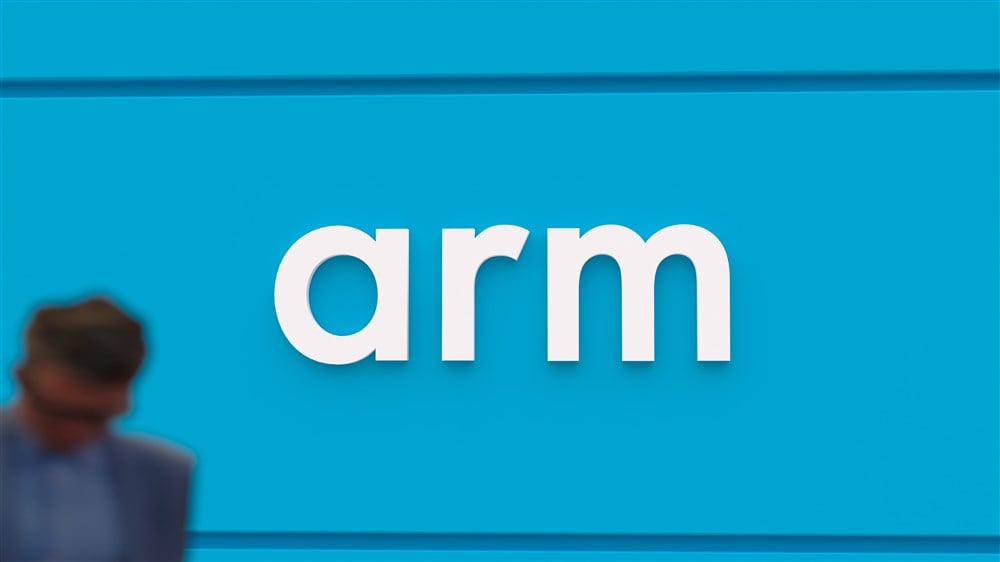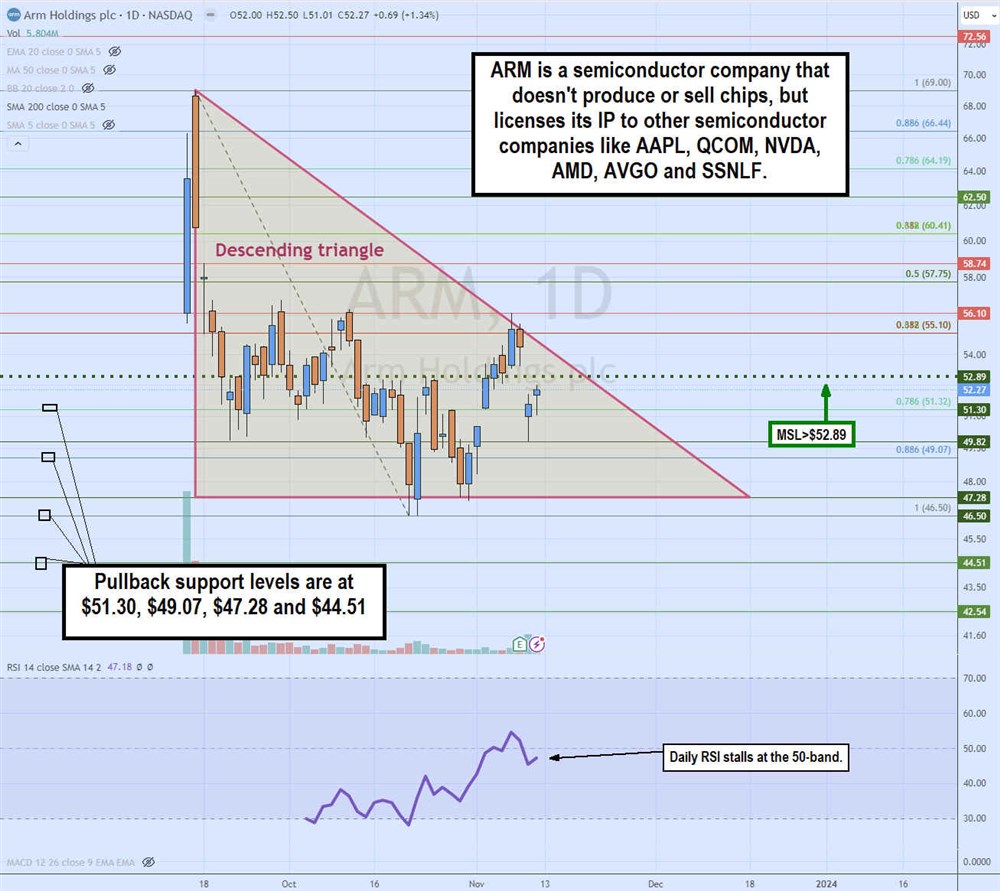
British semiconductor company Arm Holdings plc (NASDAQ: ARM) released its first earnings since reentry into the public markets. While Arm is a semiconductor company in the computer and technology sector, it doesn't produce or sell computer chips. Instead, the company designs and licenses its mobile chip architecture's intellectual property (IP). Arm's patents apply to billions of NASDAQ: AAPL">mobile devices, including almost every smartphone and tablet on the planet. It has a literal monopoly on the design of mobile chips utilizing its ARM-based processor technology. This makes ARM an asset-light and incredibly profitable company.
Softbank's hand that rocks the cradle
ARM re-IPO'ed at $51 on the NASDAQ exchange on September 14, 2023, raising $4.87 billion. Some of its largest clients are also investors in the company, including Apple Inc. (NASDAQ: AAPL), Nvidia Co. (NASDAQ: NVDA), Taiwan Semiconductor Manufacturing Ltd. (NYSE: TSM), Samsung Electronics Co. Ltd. (OTCMKTS: SSNLF) and Intel Co. (NASDAQ: INTC). However, the largest holder by far is still SoftBank, with a 90% stake. The first lock-up period expires on March 12, 2024. Investors should mark that date on the calendar to prepare for potential dilution and stock depreciation into the lockup.
Royalty revenues
Nearly half of Arm's royalties come from products released between 1990 and 2012. The company expects its chip designs to be worth $250 billion by 2025, driven by automobile growth, cloud computing, artificial intelligence (AI) chips and data centers. The company owns or co-owns over 6,800 patents and continues to file for more patents.
Licensing revenues vs. royalty revenues
While they appear to be the same, royalty and licensing are two different revenue streams. Companies pay licensing revenues to use ARM-based processor designs. Companies pay an upfront, non-recurring, one-time license fee. Companies including Qualcomm Inc. (NASDAQ: QCOM), Broadcom Inc. (NASDAQ: AVGO), Advanced Micro Devices Inc. (NASDAQ: AMD) and Huawei are licensees. Check out the sector heatmap on MarketBeat.
Royalty revenues are those earned from the sale of ARM-based chips. Licensed chip makers that produce and sell ARM-based processors pay a royalty on each chip sold. These are recurring revenues. Royalties are the more predictable revenue source.
First earnings report since re-IPO
On November 2, 2023, Arm released its fiscal second-quarter 2024 results for September 2023. The Company reported an earnings-per-share (EPS) profit of 36 cents versus consensus analyst estimates of 26 cents, a 10-cent beat. Non-GAAP operating income rose 92% YoY to $321 million. Non-GAAP cost of sales was $26 million. Non-GAAP gross profit margin was 97% at $780 million. Non-GAAP operating income was $381 million or 47% non-GAAP operating margin.
Revenues grew 28% YoY to $806 million, beating $740 million consensus analyst estimates. Licensing revenues climbed 106% YoY to $388 million, driven by AI demand from companies licensing high-performance CPUs to embed AI into devices. Royalty revenues slipped 5% to $418 million, with slower smartphone sales offset by market share gains and higher royalty rates.
In-line guidance
Arm issued in-line fiscal Q3 2024 guidance for EPS between 21 cents to 28 cents versus 27 cents consensus analyst estimates. Revenues are expected between $720 million to $800 million versus $776.22 million analyst estimates. For fiscal full-year 2024, Arm expects to see EPS of $1.00 to $1.10 versus $1.03 analyst estimates. Full-year 2024 revenues are expected between $2.96 billion to $3.08 billion, versus $2.97 billion analyst estimates. The company ended the quarter with $2.6 billion in cash, up 12.2% YoY.
Arm CEO Rene Haas commented in his shareholder letter, "Licensing revenue was up over 100% year-over-year as the demand for AI has kicked off increased investment across all end markets. Our royalty revenue benefited from market share gains in automotive and cloud computing. Our latest technologies, such as Armv9, increased penetration across all markets where AI drives the need for our unique combination of performance and power efficiency."
Analyst actions
On November 9, 2023, Morgan Stanley initiated coverage for ARM with an Equal-Weight rating and a $55 price target. JP Morgan reiterated its Overweight rating with a $70 price target. Analyst Harlan Sur pointed out the record bookings of $1.1 billion as the impressive backlog growth of 40% driven by the renewal by Apple. AI demand drove two new access license customers and two access license renewals.
Sur commented, "We believe that overall chip design activity for datacenter and accelerated compute has been accelerating and that AI is penetrating across multiple end markets, which is benefitting Arm." Sur sees a strong runway for royalty revenues driven by the transition to ARMv9 architecture and the bottoming of the PC and smartphone markets.
Arm Holdings analyst ratings and price targets are at MarketBeat. Arm Holdings peers and competitor stocks can be found with the MarketBeat stock screener.

Daily descending triangle
The daily candlestick chart on ARM illustrates a descending triangle pattern. The descending trendline commenced after peaking at $69 on September 15, 2023. The flat-bottom trendline formed at $47.28. The bounce attempts peaked at a lower high as the descending trendline continued to fall. The daily market structure low (MSL) triggers above $52.89. The weekly relative strength index (RSI) is stalled on a bounce attempt under the 50-band. The pullback support levels are $51.30, $49.07, $47.28 and $44.51.




